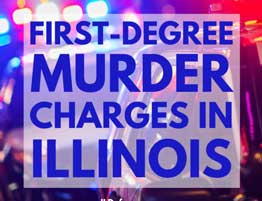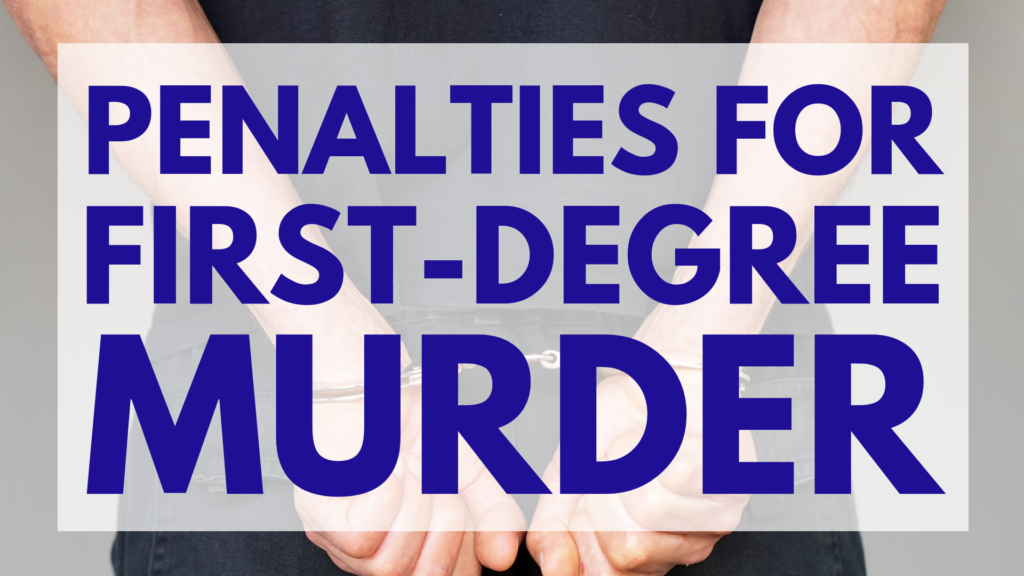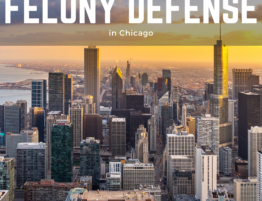
If you or someone you care about has been charged with first-degree murder in Illinois, you need to know what happens next. This guide explains it all.
First-Degree Murder in Illinois: What You Need to Know
The law governing first-degree murder in Illinois is 720 ILCS 5/9-1.
The law says that when someone kills another person without lawful justification, they’re guilty of first-degree murder if:
- He or she intended to kill the person or do them great bodily harm, or knew that such acts would cause death
- He or she knew that such acts would create a strong probability of death or great bodily harm
- He or she was attempting or committing a forcible felony at the time of the incident
That means in order to be convicted of first-degree murder, the prosecutor has to show that you intended to (or knew your actions could) kill someone or seriously injure someone – or that you killed someone during an attempt at or the commission of a forcible felony, such as rape.
First-degree murder is the most serious homicide crime possible in Illinois.

What’s the Penalty for First-Degree Murder in Illinois?
In Illinois, we don’t have the death penalty – so the maximum punishment you can receive if you’re convicted of first-degree murder is life imprisonment. Not everyone receives the maximum punishment when they’re convicted; the minimum punishment is 20 years. If you’re convicted of first-degree murder, you must serve all of your sentence. You can’t get out early.
How is First-Degree Murder Different From Second-Degree Murder?
First-degree murder involves intent, and the prosecution must prove it to the jury. What that means is that you must have intended to kill someone to be convicted of this crime – you must have known that killing the person was your goal or that what you were doing was very likely to kill him or her. The only exception is when you kill someone during a forcible felony, like rape; the court can convict you of first-degree murder even if you didn’t intend to kill that person.
In second-degree murder, which is similar to first-degree, the prosecutor has to show beyond a reasonable doubt that you killed someone without legal justification and either:
- Meant to kill the person or do great bodily harm to the person (or knew that what you were doing would kill him or her)
- Know that the act created a strong probability of death or great bodily harm.
The catch with first- and second-degree murder is that if the prosecutor can prove one of those things in court, it’s your homicide defense attorney’s job to prove that at the time, either:
- You were acting under a sudden, intense passion because you were seriously provoked by the person you killed or someone else you intended to kill
- You believed that the killing would have been legally justified, but you were wrong
When your attorney can prove one of those things, you can be convicted of second-degree murder instead, which carries a lower penalty (between 4 and 20 years in prison, plus fines).
Possible Defenses to First-Degree Murder Charges
 While every case is different, and nobody can predict how a judge will rule, it’s important that you know your lawyer can attempt to defend you against first-degree murder charges. Some of the most common ways an attorney can defend a person against these homicide charges include:
While every case is different, and nobody can predict how a judge will rule, it’s important that you know your lawyer can attempt to defend you against first-degree murder charges. Some of the most common ways an attorney can defend a person against these homicide charges include:
- Lack of intent, meaning you didn’t mean to kill someone
- Lack of knowledge, meaning you didn’t know your actions would or could cause a death
- Insanity, meaning you weren’t in your right mind at the time of the incident
- Intoxication, meaning you were drunk or under the influence of drugs at the time of the incident and wouldn’t normally have acted in that way
- Self-defense, meaning you were protecting yourself or someone else when the homicide occurred
Do You Need to Talk to a Lawyer About First-Degree Murder in Illinois?
Having a murder defense attorney by your side can lift a tremendous weight off your shoulders – your lawyer will handle all the legal aspects of your case, create a defense that gets you the best possible outcome, and answer every question you have along the way.
If you or someone you care about has been charged with first-degree murder, call us right away at 847-920-4540. You’ll talk to an experienced former prosecutor who will explain what’s going to happen next and give you the answers you need.
Get your free case review now. The sooner you call us, the sooner we can begin building a defense that gets you the best possible outcome.


